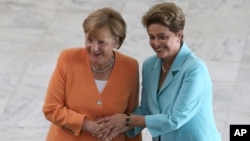Germany and Brazil committed on Thursday to a joint stance on climate change, a move that puts the largest economies in Europe and Latin America on the same page ahead of global climate talks in Paris in December.
Chancellor Angela Merkel and Brazilian President Dilma Rousseff focused mainly on environmental cooperation during a 24-hour visit by the German leader that was also aimed at boosting trade and investment in Brazil's stagnant economy.
"We agreed on common actions to deal with one of the most important challenges of the 21st century," Rousseff said.
She said Brazil is committed to reducing deforestation in the Amazon to zero by 2030.
The COP-21 meeting in Paris will seek a binding agreement on how to share the burden of capping global warming at 2 degrees Celsius (3.6 degrees F) above pre-industrial levels or lower.
Putting money behind its commitment, the German government announced 550 million euros ($615.78 million) in financing for environmental programs in Brazil.
Development loans
Germany's Development Ministry will provide Brazil 525 million euros ($587.79 million) in loans to fund the development of renewable energy sources and to preserve tropical forests. Germany also donated 23 million euros ($25.75 million) to help Brazil establish a rural land registry aimed at enhanced monitoring of deforestation.
Rousseff, whose government is reeling from the worst economic downturn in three decades and a massive corruption scandal, briefed Merkel on Brazil's ambitious infrastructure plans and invited German companies to bid for concessions in building roads, ports, railroads and airports.
Foreign and local companies alike have complained for decades about the difficulty of doing business in Brazil due to red tape and slow-moving bureaucratic agencies.
In an interview with Germany's Handelsblatt business daily, Rousseff said Brazil was working on a rule that would grant automatic approval for applications that are not decided upon within a certain time frame.
Germany is Brazil's fourth-largest trade partner. Mexico has displaced Brazil as Germany's top partner in Latin America.
Merkel and Rousseff said they want to speed up negotiations on a European Union trade deal with the South American bloc Mercosur that have dragged on for 15 years.
The exchange of proposals for tariff reductions, now scheduled for the end of this year, has been held up by Argentina's economic crisis.
Germany is interested in two-speed negotiations to get talks going with the Mercosur countries that are ready. Merkel told reporters that Rousseff is also keen to move ahead.





